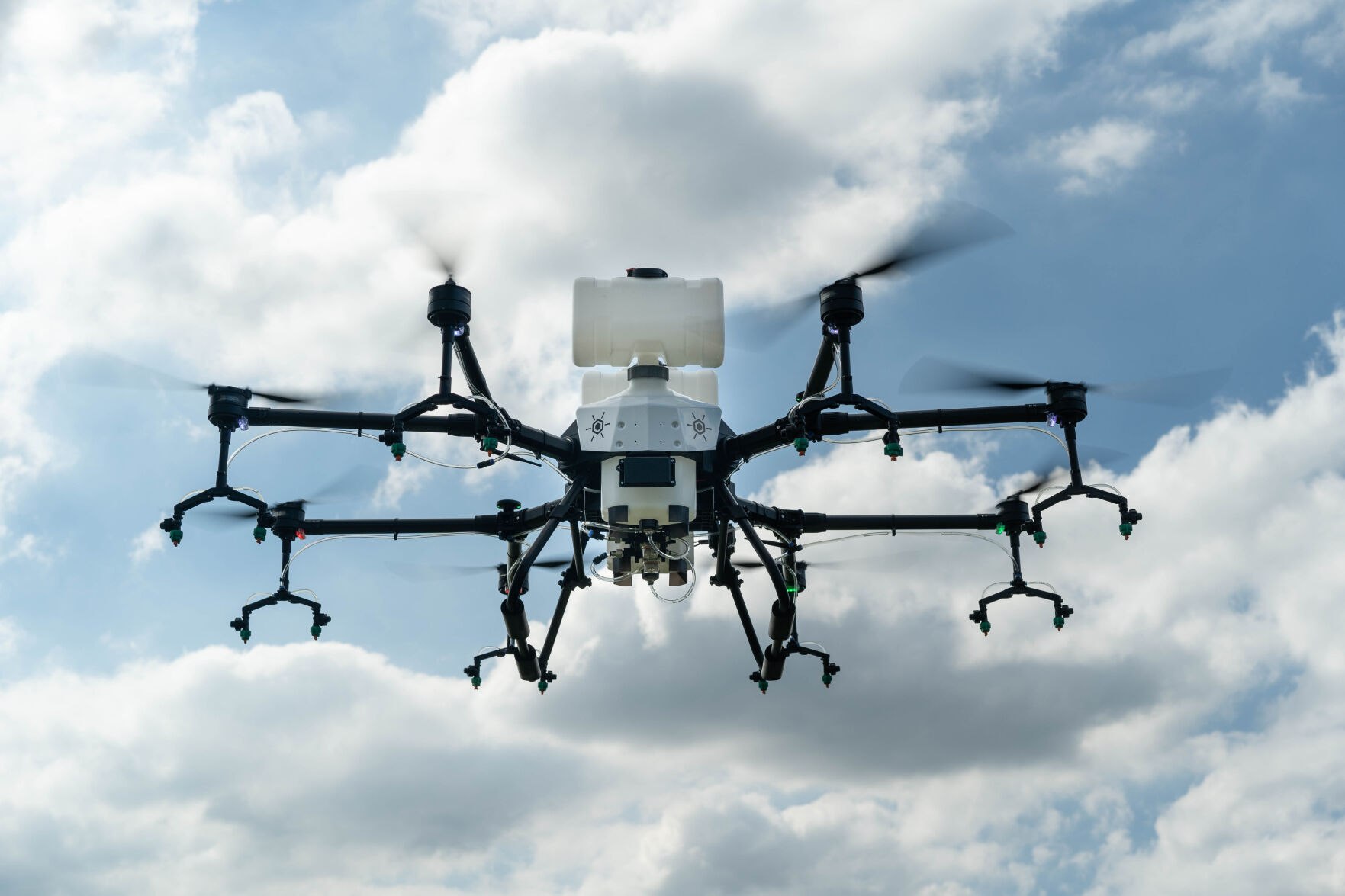Hylio debuts autonomous drone for large scale farm operations

Hylio, a leading United States maker of drones for agricultural uses, has introduced its new AG-130 drone for large scale agricultural operations.
Hylio’s “Texas-sized” model, its largest to date, the AG-130 is a fully autonomous, eight-rotor UAS platform equipped with a high-precision spraying system consisting of two 4-gallon tanks, air-induction nozzles, and electronic flowmeters. It has two wide-angle radars, a built-in HD camera and two GPS units.
Hylio promotes its drones as a cost-effective way to reduce reliance on expensive ground equipment. “Drones don’t compact the soil,” said Hylio co-founder Arthur Erickson. As they get bigger and more versatile, he believes, they can replace many functions of ground equipment, distributing fertilizer, liquid products, seed, or pesticides with better accuracy and more precise targeting. Using drones lessens human contact with pesticides and herbicides, he said.
Since drones push their products straight down, he said, they can also reduce drift of sprayed products. Erickson said about 55% of Hylio’s customers are custom applicators for hire, while about 35% are farmers who own their drones—but who might also hire them out on occasion.
Another selling point is that Hylio drones are completely U.S.-made. Chinese-made drones have long dominated drone markets, including in the U.S. “China leapfrogged to drone use,” said Erickson. “It’s similar to how many African countries without landline phone infrastructure leapfrogged to cell phones.” As a result, Chinese companies acquired an early lead in drone technologies and manufacturing expertise. The dominant Chinese drone-maker is DJI, which accounted for more than 76% of American drone registrations in a March 2021 study by Drone Industry Insights—despite the trade war.
In December 2021, the U.S. government put DJI and seven other Chinese companies on an investment blacklist because of Chinese human rights violations against Uygher Muslims. That means Americans can’t invest in, or sell to, DJI. Since 2017, the Pentagon has banned use of Chinese-made drones by federal contractors. DJI said it had "done nothing to justify being placed on the Entity list," and that "customers in America can continue to buy and use DJI products normally."
The AG-130 Enterprise Kit includes a toolkit for drone maintenance and operation, eight 16 amp, 44.4V (710 watt) lithium-polymer batteries with LED indicators, and four, two-channel lithium polymer battery charging units that are each capable of charging two batteries simultaneously. Each charger can charge a pair of batteries in approximately 30 minutes depending on the charge rate that the user chooses.
The Enterprise Kit includes lifetime access to Hylio’s proprietary agricultural UAS ground control software called AgroSol, a one-year warranty for component defects, and a full training course covering the maintenance and handling of the UAS, precision agricultural knowledge and techniques, UAS regulations, and safety.
Hylio’s AgroDrones can be flown in either autonomous or manual flight control modes. To fly in autonomous mode, operators simply need to define an area to treat, input how much product to apply, press “Take Off” and the drone will do the work. While the Hylio drone is in the field applying material, an array of sensors relays real-time access to data such as GPS position, flow rate, altitude, and more. All flight and treatment data are stored in the operator’s account providing access through the Hylio interface to historical application maps, maintenance data and more.
Operators can command up to four unmanned aircraft systems from a single ground station as they complete fully automated operations. Each Hylio drone also comes with an RC controller for optional manual mode. Radar sensors guide the drone to avoid obstacles in autonomous or manual mode. And for situations where product application needs to be accurate down to the centimeter, Hylio offers add-on RTK base stations for enhanced precision.
How long do drones last? Hylio’s drones are durable, Erickson said. They have no-friction propulsion and few moving parts. “It’s really too early to tell what their effective lifespans might be. We have 7-year-old drones that are still spraying. They never seem to die of old age. Crashes are rare, but they can happen. If they do, though, customers are usually up and spraying the same day.”
As lithium batteries get more and more efficient, Erickson said, drones will become more cost-effective.
Erickson makes one more point: Hylio’s drones are not hard to learn. He tells the story of one farm customer in his 60s who was so unfamiliar with technology that he had never opened a laptop—until he got one with his drone purchase. After a bit of training, “He was spraying his first corn crop within seven or eight hours.”
David Murray can be reached at [email protected].